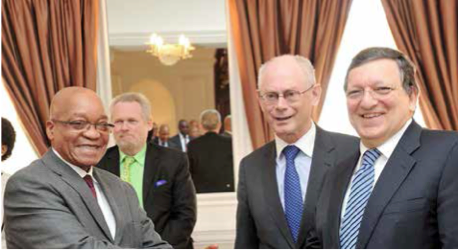International relations
South Africa and the European Union (EU) have agreed on a new R 1.3 billion funding to support South Africa's infrastructure programme. The money will come in the form of grants and loans from the Development Bank of Southern Africa (DBSA) and European Development Finance Institutions.
The two parties also agreed to electrify 300,000 households in rural areas. The EU will also finance development programmes that support job creation to a tune of R 650 million.
These agreements were reached at the sixth South Africa-European Union Summit held recently. The European Union remains South Africa’s largest regional trading partner. “At least 2000 EU companies have invested over R 60 billion (Foreign Direct Investment Stock) in South Africa creating over 350,000 direct jobs,” said a joint statement issued after the summit.
Between 2008 and May 2013, there were over 350 Foreign Direct Investment projects from EU into SA, amounting to a capital investment of R162.43 billion and creating 48,686 jobs. According to President Jacob Zuma, a total of 46 foreign direct investment projects from South Africa into the EU were recorded, representing a total capital investment of 10.53 billion rand. “The investments by 37 South African companies in the EU countries created a total of 2,371 jobs in the EU, spread over a diverse range of sectors.” The statement also said from 2014, European students and university staff will have the opportunity to study in South Africa under the Erasmus Mundus Scholarship Programme which has benefited 388 South African masters and doctoral students and university staff since 2011.
The agreement provides for investors from the EU to attend a conference in South Africa focusing on “the implementation of the Youth Employment Accord; and possible matching finance for youth-owned enterprises and cooperatives”. The accord involving government, labour, business and social partners was signed in April, committing the parties to boost economic opportunities for the youth.
On the sideline of the summit, South Africa also signed an agreement with the European Atomic Energy Community to cooperate in generating nuclear energy.
President Zuma welcomed the agreements reached by the two parties, saying they will help South Africa overcome its inherited challenges of unequal wealth and resource distribution, inequality, unemployment and deeply entrenched poverty.
“We are of the firm view that given these realities, the EU should continue its development programmes in South Africa, complementing as they do, the work of government, within a developmental framework.
“We look forward to a continued mutually beneficial partnership and are pleased with the fruitful discussions.”
“While we rightfully celebrate the 50th anniversary of the African Union (AU), we are cognisant of the challenges we face. The road ahead to attain peace, stability and prosperity on the African continent for all her peoples is still arduous.
“This calls on all leaders of the continent to sharpen their resolve and through the AU, raise our collective voices, and confront the challenges presented by the current global dispensation.”



 Facebook
Facebook Twitter
Twitter WhatsApp
WhatsApp